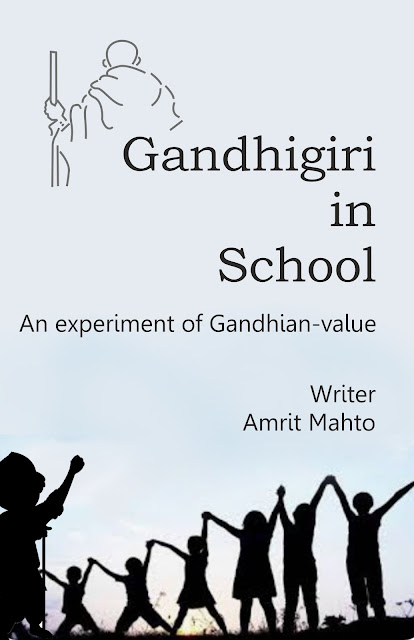When
all the Kings and Military Generals of our era, who make so much noise today
and have such a prominent place in life, will all be forgotten, Mahatma ji
still 'the greatest Indian after Gautam Buddha’ and the ‘greatest human after
Christ’ will be alive and honoured as. This is a parable of an ordinary human
becoming a great human by his sacrifice and penance. Gandhiji is a unique
personality of this nation. We Indians are very fortunate to have him because
our ‘Father of the Nation’ is the inspiring human values of peace, non-violence, love,
harmony and universal importance not only in India but all over the world.
Such
a great man does not hesitate to do even the smallest work in Sabarmati Ashram.
In Sabarmati Ashram, he used to do all his work himself, like grinding flour,
cutting vegetables, making kitchen, planting trees, cleaning the mud, washing
his clothes, serving the nearby villages etc. The character of this story
'Vikas' learns a lot from the activities of Sabarmati Ashram. As soon as he
takes admission in the 'Royal Public School', he participates in the
‘Student-Council elections’ and he is selected in the post of 'In-charge of
Sanitation and Discipline' in a very short effort. Along with this, the
challenge comes on him that how he will be able to work according to his
position.
Vikas
is a talented student of his school, he is ahead in studies as well as in other
activities. One of his qualities is that he is very attentive and sensitive to
the environment around him. When he sees that the students are littering the
school premises during lunch break by throwing leftover vegetable peels and
other things, he sets out to clean it himself. He not only collects pieces of
paper and garbage with his friends, but also teaches the lesson of cleanliness
to the students. He even cleans the water-house and practical lab.
It
breaks his heart to see torn books of poor students in school, children wearing
dirty and torn uniforms and disabled children walking limp in the gallery. For
this he meets his principal and urges him to set up 'Vidyasagar Student Welfare
Fund' in the school. With his efforts, this fund is formed and through this the
poor and needy children are helped.
Vikas
lived in the hostel. While eating in the mess, he always used to get
uncomfortable seeing the mess of the dining table and mess utensils. He decided
to clean up one day and cleaned the entire mess along with his friends.
Polished the utensils and washed the entire hall and gallery thoroughly with
water. It often happened in hostels that the mess staff used to throw the
leftover vegetable peels outside the window which stinks and pollutes the surrounding
environment. For this, Vikas dug a big pit behind the hostel with the help of
his friends and dumped all the scattered garbage in it. The mess staff was also
asked to throw garbage in it from the front.
Vikas
was so conscious about the cleanliness of the surrounding that he also goes to
the village 'Pandaria' adjacent to the school and carries out the work of
cleanliness and with the help of his friends not only cleans the dirt around
all the hand pumps of the settlement. Rather, there is also a self-made
cleanliness message ‘Display-Board’ installed there. The people of the village
praise him a lot in this work and also help as much as possible.
The
Royal Public School has a tradition of conferring a 'Gandhi Award', a
certificate of appreciation and twenty thousand rupees to a single child who
has given the best performance and has set an outstanding role model. The
'Shala Vikas and Management Committee' found Vikas best suited for this and
honored him with the 'Gandhi-Award' for his best performance in the school and
setting an excellent role model. In this story, it has been told that how a
modest student teaches the lesson of cleanliness by doing 'Gandhigiri'
(following Gandhian value) in the school and takes the biggest award of the
school 'Gandhi-Award' with him.
The presented version is an English adaptation of the
author's original work "School me Gandhigiri". It is natural to have
grammatical errors in translation work. Therefore, regardless of the mistakes,
good suggestions are expected from the readers so that the same can be included
in the next edition. Jai Johaar...!
Date: 2 Oct, 2022 Author
Amrit
Mahto
Mob : 9827974340

